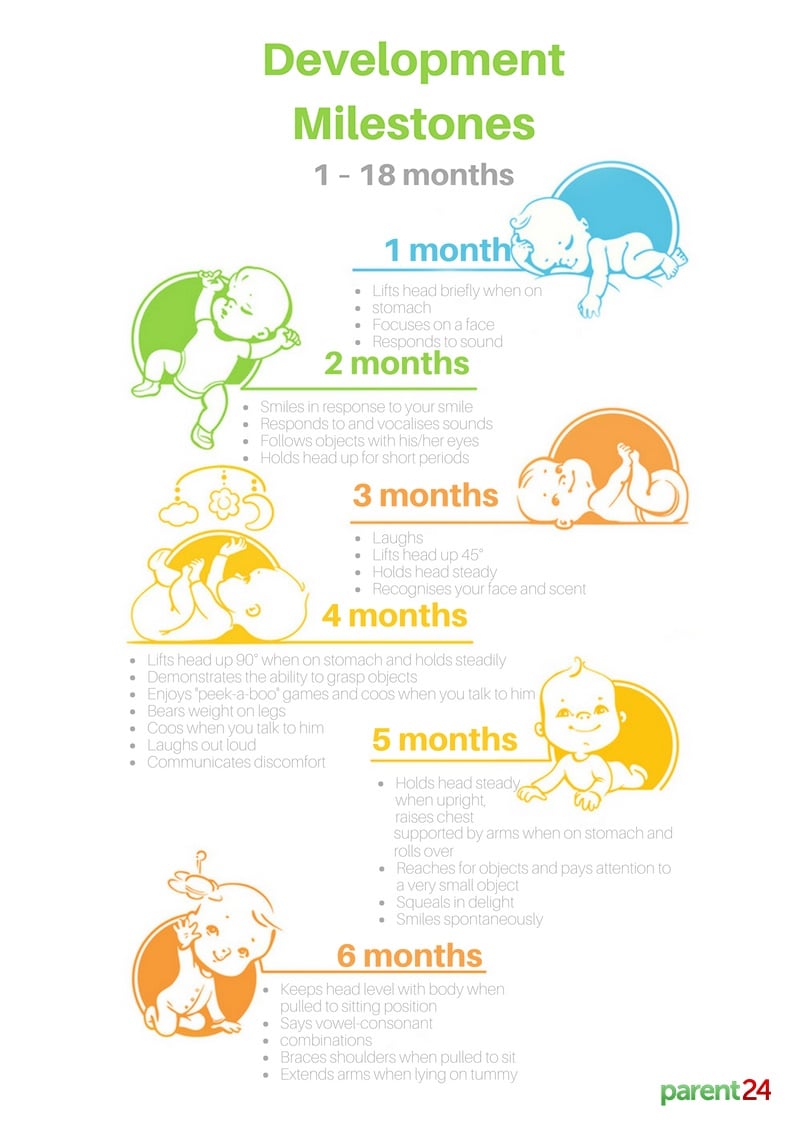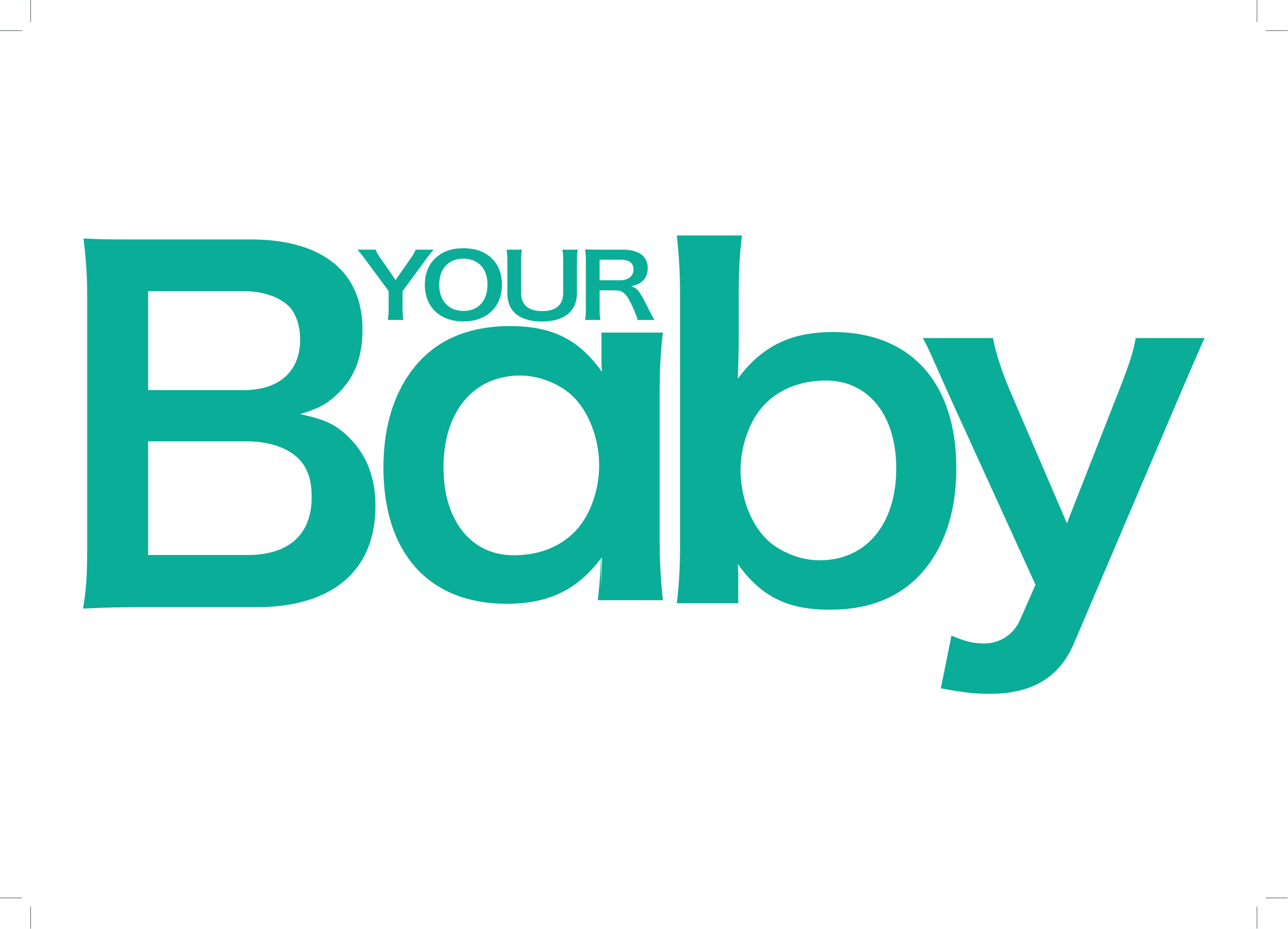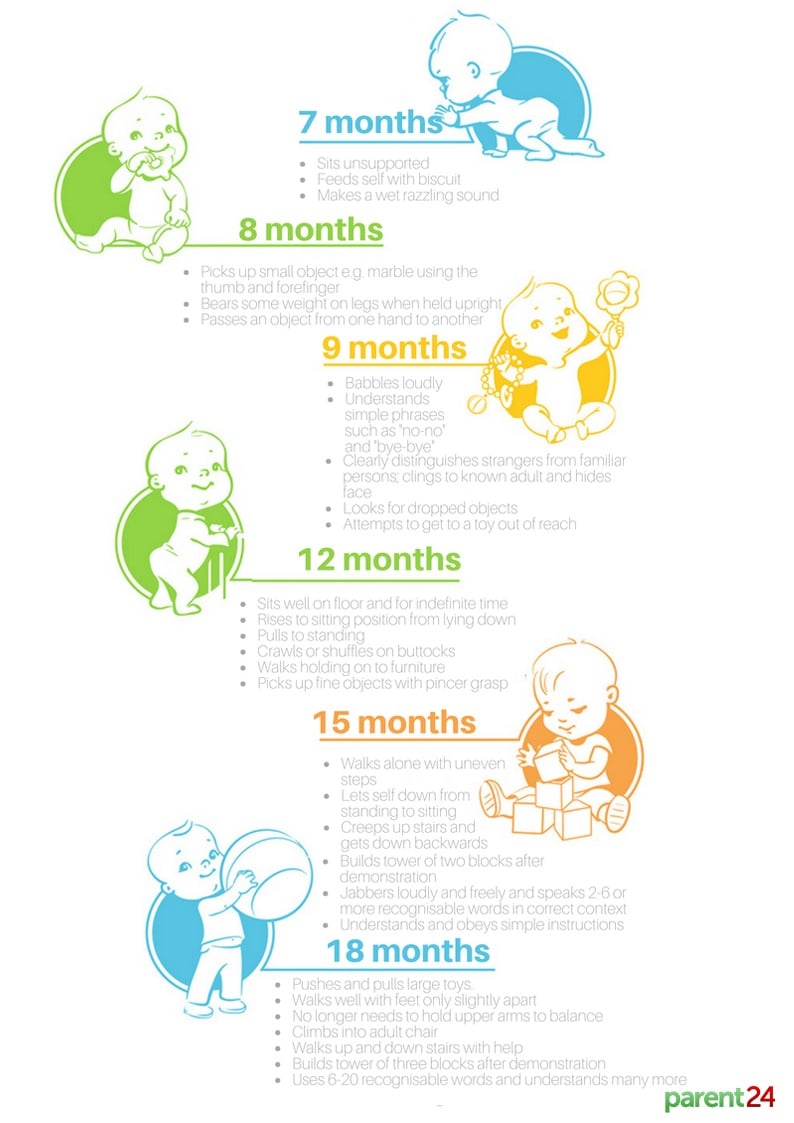It’s most exciting to watch your baby turning from a helpless bundle into an independent little individual with a personality all her own.
5 things about milestones you need to remember
Many parents worry that their child isn’t making progress “on time”.
Go for regular check-ups
The best way to make sure that your baby is on track with her developmental milestones is to take her for regular check-ups with your paediatrician or baby clinic sister. They’ll check your baby’s physical development, weigh and measure her, observe her and chat to you about her progress and what you should be doing to help (including checking up on her diet, especially as she moves on to solids).
Development milestones are only a guideline
Keep in mind that developmental milestones are worked out at the average age at which children acquire new skills, which means that many babies acquire the skills later, and many acquire them earlier. They are intended to serve as a guideline only, and not as a rule. Babies develop at their own pace, and a slightly slower development than average is not a reflection on her future abilities.
Development starts at the head and works its way down
At the same time, realise that because your baby is an individual, it’s quite likely that she might be simultaneously a very early talker but equally a late walker, for example. Don’t fret!
It’s also helpful to understand that development starts at the head and works its way down through the body in a specific order. Your baby won’t acquire one skill before she’s developed the specific muscle control and thinking patterns that this skill needs.
How to booster development
In real terms, this means that while you can of course stimulate your baby, you can’t push her to acquire skills she’s not ready to develop. What you can do, however, is take time to play creatively with your baby, and spend lots of time in communications – both talking and listening.
Read to her, sing songs and say nursery rhymes, and babyproof certain areas and give her the freedom to explore them. Be physical with your baby: touch her, hug her, tickle her, massage her...
Consistently delayed milestones
If you do feel your baby’s milestones are consistently delayed, talk to your doctor. There may be an underlying reason for the delay, and if this is the case then the sooner you identify the cause and take action, the better.
For example, delays in talking may be linked to hearing loss and if this is the case, then once you have discovered this and taken action, your baby can start to catch up. Above all – enjoy your little one in these early, all-important months. The time will go by so quickly and when her first birthday arrives, you’ll look back in amazement at how far she’s come and how time has flown.
Development milestones: 12 to 24 months
Development milestones: 24 to 36 months

Click on the image to download.
Newborn
Physical development
- Babies are born at an average weight of 3kg with a head circumference of 33- 35.5cm
- They sleep 18 – 20 hours a day
- They have primitive newborn reflexes and no head control
- You baby will lie on her back with her head to one side
- She can see about 20 – 25 cm away
- She turns to light or your voice, and will respond with mouth movements
Feeding needs
- Breastfeeding is ideal. Try to feed her as soon as you can, and get help with latching and correct positioning
- Feed on demand – probably about 8 feeds per day, for about 10 - 20 minutes
- If you’re bottle feeding, select an infant formula designed for the first 6 months of life
- Formula fed babies need 150 – 180ml per kg per day
- Hold her close, look into her face and talk to her gently
Emotional, social, talking
- She stops crying in response to softly spoken words, especially her mother’s
- She looks intently at her mother’s face when feeding
- She’s upset by loud noises and harsh voices
- She enjoys close skin-to-skin contact and eye contact
- She loves to see you, smell you, hear you and feel your loving touch
- She communicates by crying – that’s how she lets you know that she’s hungry, tired or unhappy
Your newborn baby
6 weeks
Physical development
- By 6 weeks she can hold her head up briefly
- She lies on her back with her head in the midline
- She turns towards familiar voices
- She can lift head and chest when put on tummy
- She can control her eye muscles to follow a moving object
- She holds her head steady and back straight when gently pulled to a sitting position
Feeding needs
- Continue with breastmilk or starter formula
- Breastfeeding should be well-established and you are probably settling into a routine
- Make sure you are getting the rest, liquids and nutrition you need when you are breastfeeding
Emotional, social, talking
- She shows pleasure when she’s sung to, tickled and played with, by kicking her legs and waving her arms
- She recognises her family and important care givers
- She smiles at about 6 weeks – this is a sign that she wants to be sociable – and laughs spontaneously
- When baby’s needs are consistently met, she learns trust and cries less
3 months
Physical development
- At around 3 months of age, her knees will bend when she’s held in a standing position
- Teething might begin between 3 and 6 months
- She’ll go from holding a toy or rattle briefly to shaking the rattle to make a noise
- At 3 months, she may reach for an object that’s close and in her line of sight
Feeding needs
- At 3 months, milk is still the only food your baby needs
- Continue with breastmilk or starter formula
- As your baby nears 6 months, you should look for signs that she’s ready for solids
Emotional, social, talking
- At 3 months, she’s fascinated by faces
- She will “reply” to your talking with her own sounds
- She starts to anticipate rituals like bathing and feeding and will respond with coos, smiles and wriggles
- She shows pleasure with laughter and squeals, and annoyance by shrieking!
- She’s sensitive to tone and emotion
- Her memory is developing and she is starting to remember people
- When she drops a toy, she forgets about it
- She’ll practise talking on her own, making more and more different sounds
6 months
Physical development
- Your baby’s birth weight is going to double at around the age of 5 to 6 months
- By 6 months, she can bounce on her legs when she’s held in a standing position
- At 6 months she can reach for objects and put them in her mouth, and also transfer a toy from one hand to the other
- At 6 months, she can push her head, shoulders and chest off the floor when she’s lying on her tummy, roll from front to back and sit supported by cushions
Feeding needs
- Remember that at 6 months, milk will still be the mainstay of your baby’s diet
- You can continue with breastmilk or introduce a follow-on formula that is designed for babies over 6 months
- By around 6 months you can start introducing solids
- These guidelines include the following: she’s doubled her birth weight, she can hold her head steady when fully supported, she pushes herself up on extended arms when she’s on her tummy, she shows an interest in your food
- At around 6 months, food should be about the consistency of smooth yoghurt when you begin
- Always offer 1 new food at a time and wait a few days before introducing another one, in order to check for possible food allergies
Emotional, social, talking
- By 6 months, she turns to your voice and enjoys people and other babies
- She’s sensitive to tone and emotion
- She says “ba”, “da” and “ka” at 6 months
- At 6 months, she can pull herself up when her hands are grasped
9 months
Physical development
- By 9 months, she can sit unsupported, wriggle and squirm and even start to crawl
- She can also pull to a standing position with support, and may take a step
- Her hearing has improved and she will scan a room to see where a voice or sound is coming from
Feeding needs
- At 9 months, your baby will be drinking 500–600ml breastmilk or follow-on formula a day, and eating three small meals a day
- Food should be thicker and lumpier
- Give finger foods and always watch your child eating so she doesn’t choke
- Let her feed herself with finger foods like chunks of ripe banana, toast fingers, cooked peas or pasta (you can start this as early as 9 months)
Emotional, social, talking
- Her memory is developing and she is starting to remember people
- She also recognises herself in the mirror or a photograph
- From 7 or 8 months, she makes lots of consonant sounds with double syllables
- By 9 months, she may be nervous of strangers and cling to you – this is very normal
- At 9 months, she often shouts to get attention, and understands some basic words (“no” or “bye-bye”)
- She looks for the dropped toy
12 months
Physical development
- By 12 months, she’s crawling confidently
- She also pulling herself to a standing position and may be able to walk holding onto furniture or your hand – or even unassisted
- She points to what she wants and can pick up a small object with her thumb and index finger
- Now is the time to baby-proof your home if you haven’t already done so!
- She can get to a sitting position from her stomach
- At 12 months, she can hold different objects in each hand
- She’ll offer you a toy
- By 12 months, she should have regular sleep times and patterns
"My baby isn't crawling yet"
Feeding needs
- If there’s a history of food allergies in your family, stay away from wheat, dairy, nuts, eggs, seafood and other potential allergens till at least 12 months
- At 12 months, your baby can eat just about anything that the rest of the family eats (as long as there’s no history of allergens)
- Continue to be careful when your toddler eats and beware of her choking
- Offer water or diluted juice and give it in a cup and not a bottle
- She’ll start to have food preferences now and knows what she likes and doesn’t
- Look for fortified cereals, with added vitamins and minerals
- Remember that toddlers are erratic eaters and not likely to eat regular amounts every day
Emotional, social, talking
- At 12 months, she is sociable but wants to be near you
- She’s formed strong attachments to other important caregivers
- She recognises and responds to her name
Also read:





 Publications
Publications
 Partners
Partners












